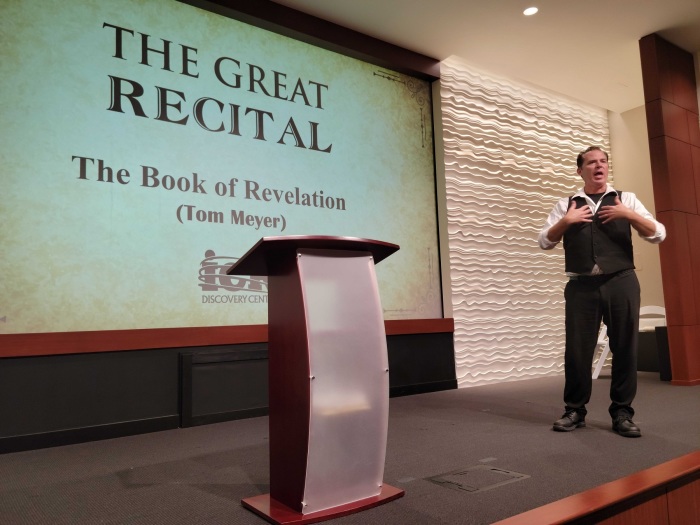'The Great Recital' brings New Testament to life through verse-by-verse readings from memory

DALLAS, Texas — When it comes to the words of Scripture, professor Tom Meyer — also known as the Bible Memory Man — believes sometimes hearing makes all the difference.
“I compare it to reading Mozart versus hearing Mozart,” Meyer told The Christian Post. “You might be able to read Mozart on the page, but to hear someone play Mozart, especially someone who has the piece memorized and believes it, then the piece takes on another dimension.”
Meyer, a professor atShasta Bible College of Redding, California, has earned his moniker for having committed 20 books of the Bible to memory, a feat that has taken him to various venues across the country where he’s looking to make history.
“The Great Recital,” which takes place through Oct. 15 at the ICR Discovery Center, involves Meyer and six other Bible memory experts who perform verse-by-verse readings of the entire New Testament, all from memory.
Coinciding with the Feast of Tabernacles, when the nation of Israel would gather for a celebratory reading of the Torah, Meyer said he specifically scheduled The Great Recital to occur during the same period of time.
In fact, for Meyer, The Great Recital offers not only an opportunity to share God’s Word with others, but also to prepare its hearers for what many believe to be a pivotal election for the future of the United States.
“The Bible records instances of persons reading Scripture aloud at public gatherings like Sukkot,” he said. “In Bible times, this custom was intended to produce a life of obedience and ensure a continuation of the nation of Israel’s divine prosperity.”
“In like manner, this modern-day public proclamation of the Word of God shortly before the midterms will inform those who listen as to what the God of the Bible requires of them not only as an individual but as ‘one nation under God,’” he added.
But with the New Testament spanning 27 books and more than 180,000 words, Meyer knew he needed some help to pull it off.
Instead of bringing in trained actors, Meyer sought those whom he described as “regular people who fear God and love His Word,” including retired schoolteacher Scott Firebaugh, Brittany Schlichter, a church secretary, and Timothy Frudd, a podcaster and journalist.
Resembling less a traditional church setting and more like one might imagine open-air preaching in the first century looked like, the recital uses different translations of Scripture: Firebaugh, for example, prefers the King James Version, while others opt for the ESV or NIV.
Deliveries are also varied, ranging from Meyer's flair for the theatrical to a more subdued approach favored by Firebaugh and others.
Frudd, who is tasked with presenting both the Gospel of Luke and the Epistle to the Galatians by memory, said the sheer volume of the work can be a bit daunting, especially when you consider the Gospel of Luke alone is over 25,000 words long and takes more than two hours to recite.
“It requires a ton of memorization practice, a ton of voice training for stamina, and a lot of mental focus, and a lot of prayer that God will give you the strength,” said Frudd.
Although Frudd started on the Bible memorization path early and later earned his master’s degree in biblical exposition, he didn’t cross paths with Meyer until the two met at the Creation Museum and its sister attraction, the Ark Encounter, in Kentucky, where Meyer was overseeing classes on Scripture memorization.
After having Meyer on his “Heavenward Thinking” podcast, Frudd said Meyer surprised him by asking him to join the effort, which he called both terrifying and exciting.
But Frudd said he believes it’s been his own personal walk of faith that has seen the biggest impact from memorizing the Bible.
“It just really transforms your whole life,” he said. “There’s nothing that I found studying the Bible in any kind of way that’s more powerful than actually memorizing the Word of God, getting that in us, so that it’s flowing through our mind so that we can recall it whenever we’re going through difficult times.”




























